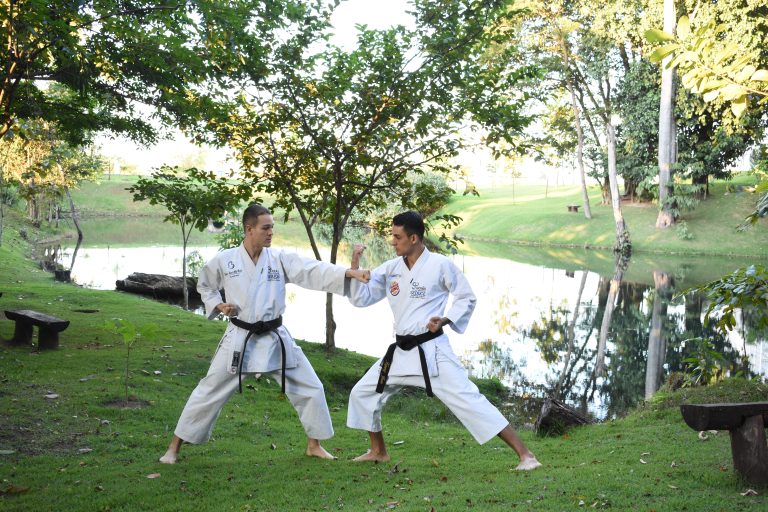How to Learn Karate as a Martial Art
Karate is a traditional martial art that originated in Okinawa. It involves using strikes to defend oneself or attack opponents. This martial art helps in building overall coordination, strength, and balance.
Learning karate is not only for self-defense but also has health benefits. Practicing karate can lower blood pressure, reduce stress, and promote physical fitness. If you are interested in learning karate as a martial art, here is how to get started.
Find a Karate Club
The first step in learning karate is finding a local karate club or school. Search online or ask for recommendations from friends or family members who have experience in karate. Make sure to choose an accredited instructor with a good reputation.
Learn the Basics
Once you’ve found a club, it is important to learn the basics of karate. This includes learning the stances, strikes, kicks, and blocks. Take time to master these techniques before moving on to more advanced moves.
Practice Regularly
The key to learning karate is practice. Regular training is essential for mastering the techniques and improving overall fitness. Set a schedule for training and stick to it. Consistency is the key to progressing in karate.
Focus on Form and Technique
In karate, form and technique are crucial. Ensure that you practice with correct form and technique to prevent injuries and promote efficient movement. It is better to start with slow and controlled movements before gradually progressing to faster and more powerful strikes.
Train with others
Training with others is an essential aspect of karate. Not only does it help in creating a sense of community, but it also provides opportunities for learning new techniques and receiving feedback. Practicing with others will help you improve more quickly and efficiently.
Set goals
Setting goals is crucial in karate. This helps in measuring progress and keeping motivated. Identify specific goals to work towards, such as mastering a particular technique or earning a Belt.
Conclusion
Learning karate is an excellent way to improve both physical and mental well-being. By following these steps, you can start your journey towards becoming a karate master. Remember to practice regularly, focus on your form and technique, and never give up. Art of karate has helped people worldwide to promote better health and a happier lifestyle.
Frequently Asked Questions About Learning Karate as a Martial Art
Karate is a martial art that originated in Japan centuries ago, and it’s been popularized around the world as a form of self-defense, physical fitness, and mental discipline. If you’re someone who wants to learn karate, you might have some questions. Here are some common questions that people ask about learning karate.
1. What is karate?
Karate is a martial art that originated in Okinawa, Japan. It’s a dynamic practice that involves a complex system of strikes, kicks, blocks, and throws. Karate is not just about physical techniques, though. It’s also about developing your mental and spiritual strength through self-discipline, self-control, and concentration.
2. Can anyone learn karate?
Yes, anyone can learn karate. Karate is a martial art that can be practiced by people of all ages, genders, and fitness levels. However, the level of difficulty of karate may vary depending on the individual’s physical condition and health status.
3. What are the physical benefits of learning karate?
Karate is a great workout that can benefit your physical health in many ways. These benefits may include:
- Improved cardiovascular health
- Increased strength and endurance
- Better coordination, balance, and agility
- Increased flexibility and mobility
- Weight loss and management
4. What are the mental benefits of learning karate?
Karate is not just about physical fitness; it also has many mental benefits. These benefits may include:
- Increased self-confidence and self-esteem
- Better focus and concentration
- Reduced stress and anxiety
- Improved discipline and self-control
- Increased mental toughness and resilience
5. What do I need to start learning karate?
To start learning karate, you will need some basic equipment, including:
- Karate uniform (also called a gi)
- Belt (different colors indicate your level of proficiency)
- Mouthguard (to protect your teeth and jaw during sparring)
- Protective gear (such as gloves, shin guards, and headgear)
You might also need to find a reputable karate school or instructor to guide you in your learning.
6. How long does it take to learn karate?
The time it takes to learn karate depends on several factors, such as your level of dedication, your physical condition, your capacity to stay focused, and the intensity of your training. However, reaching the level of black belt usually takes several years of consistent practice.
7. What are the different levels of karate belts?
Karate belts are ranked according to the level of proficiency of the student. Generally, there are ten levels of karate belts, from beginner (white) to expert (black). The colored belts are:
- White
- Yellow
- Orange
- Green
- Blue
- Purple
- Brown
- Red
- Red and black
The transition from one belt to the next is marked by a test that assesses the student’s skills and knowledge.
8. Is karate dangerous?
Karate, like any other martial art, involves some physical contact, so there’s always the risk of injury. However, if you train in a reputable school with a qualified instructor and follow safety guidelines, the risk of injury is low. Moreover, the benefits of practicing karate outweigh the risks.
9. Can karate be used for self-defense?
Yes, karate can be an effective form of self-defense. Karate teaches you to defend yourself against physical and verbal attacks by using strikes, kicks, and blocks. Additionally, karate can help you develop the mental toughness and awareness to avoid potentially dangerous situations.
10. How do I choose a karate school or instructor?
Finding the right karate school or instructor is crucial for your success in learning karate. Here are some factors to consider when selecting a school or instructor:
- The reputation of the school and instructor
- The instructor’s qualifications and experience
- The quality of instruction and curriculum
- The attitude and behavior of the instructor and students
- The location and schedule of classes, and the cost of tuition
It’s essential to observe a few classes or talk to the instructor before signing up to ensure they align with your goals and expectations.
Conclusion
Karate is a martial art that offers many physical, mental, and emotional benefits. Whether you want to learn self-defense, improve your fitness, or develop your spiritual and mental strength, karate can be a great tool for achieving your goals. By practicing karate, you can become healthier, more confident, and disciplined, and learn valuable skills that can benefit you in all areas of your life.
Inhaltsverzeichnis






